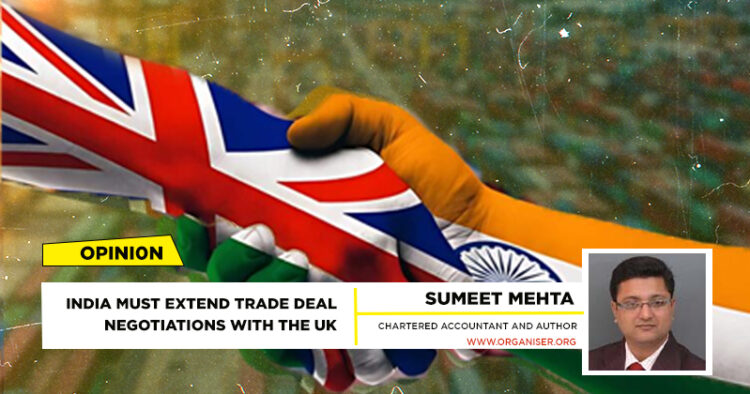The UK Prime Minister Rishi Sunak has initiated some action against Khalistanis by freezing a billion rupees in their 5,000 accounts. This is around 10 million Pound Sterling. This amount is peanuts! To run such a well-oiled and organised cessationist movement from London with tentacles spread across Canada, the US, Australia, etc requires a lot more money. Needless to say, the Khalistani movement is a product of MaxArthur McAuliffe’s distortion of Guru Granth Sahib, which he translated from Gurmukhi to the Queen’s language. Subsequent legislation of the SGPC Act brought the Jat Sikhs in the forefront to manage gurudwaras and thereby gain a temporal control over Sikhism. Since then the British Intel agencies have worked on Khalistanis and have used khalistani as a lever, a tool, to play with India. After the creation of NATO, these assets were transferred to the American puppet masters. Khalistanis have since the beginning been a tool in the hands of foreign agencies.
In this backdrop, Rishi Sunak freezing some peanuts in bank accounts is not a credible action. It is obvious that Rishi Sunak is desperate to clitch the deal with India and sign the Indo-UK FTA. For that, he has to placate the Indian side, for which he has taken these half hearted measures like freezing around 10 million Pound Sterlings.
The UK is going for polls in January 2025. As of now, there is no clarity as to whether the Conservatives will return to power. All said and done, the Labour Party – which is backed by Pakistani and other Muslims and inspired by Leftist ideology, will be extremely hostile to India, if they come to power. In such a situation, it is advisable for the Government of India to extend the negotiations until the 2025 General Elections results are out and we get a clarity on who is in power, and accordingly, we negotiate with the ruling dispensation.
Rishi Sunak’s desperation to act against Khalistanis is mainly driven by the fact that the UK badly needs this deal to stay afloat and recover the losses arising from Brexit. Prof. Dr. Gautam Sen, who taught International Political Economy at the London School of Economics and Political Science, has brilliantly explained this in his article in The Daily Guardian, which is as follows:
“This FTA between India and the UK would have a strong parallel with the system of Imperial Preference established at the Ottawa Conference of 1932. The system of trade preferences established at the time between British dominions, with Britain the centre, was a response to the economic collapse of 1931.
The proposed FTA will effectively reduce India to Dominion status and focus on the attempt to rescue Britain from its current dire economic predicament. Most importantly, the Indo British FTA will rule out any relaxation of trade restrictions between India and the EU. This situation would arise because any agreement between the EU and India over free trade would facilitate backdoor entry into the EU for post Brexit Britain, if it already had a FTA with India. The EU would not accept such a perverse facilitation of British economic interests, and the EU together is a much more important trading partner for India than the UK.”
The report by Cambridge Econometrics, commissioned by City Hall, released in January 2024, says that the UK lost around two million jobs due to Brexit and nearly 300,000 in London. London’s economy shrank by around GBP 30 billion, while the UK lost around GBP 140 billion due to Brexit. The research paper estimates that the UK is expected to face an economic loss to the extent of GBP 300 billion by 2035 out of which GBP 60 billion of loss is in London alone. Mayor of London, Sadiq Khan has also taken cognizance of this loss arising due to Brexit.
Hence, the UK has turned its attention towards India to recoup part of its losses arising from Brexit. One of the prime benefit of the proposed India UK FTA is the removal of tariff based trade barriers created by India on imports from the UK, especially in products like British made cars, electric vehicles, and Scotch Whiskey and other alcohol products, which has a duty of 100 per cent and 150 per cent. Currently, only 3 per cent of product categories that UK exports to India are tariff free. Nearly 91 per cent of the value of total merchandise imported by India from the UK is subject to average to high tariff. Over and above that, India is using technical barriers on sanitary and phytosanitary products. The FTA aspires to bring down these trade barriers which would benefit UK businesses. According to the recent research report by the Global Trade Research Initiative (GTRI) there may be only limited benefits for India as far as merchandise goods from the proposed FTA are concerned.
Services sector is the major driver of the UK economy and contributes around 4/5th of the economy and around half of the total export. In 2020, the UK exported services worth GBP 3.3 billion to India. India’s service sector is a tad above half of total Indian economy and the UK – which is the world’s second largest services exporting economy; aspires to increase its share in Indian service sector.




















Comments